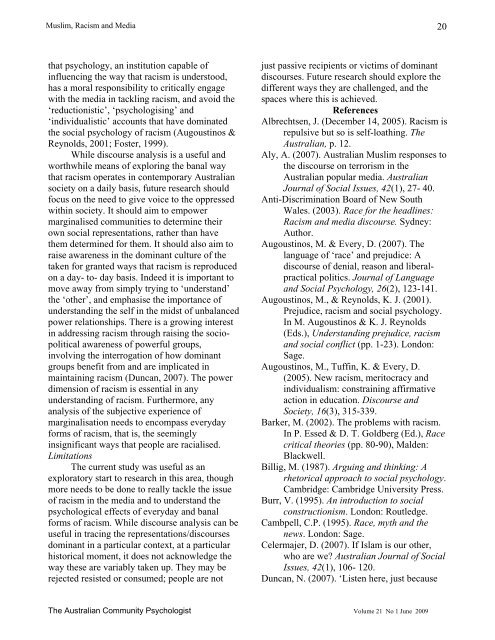issue 1 09 - APS Member Groups - Australian Psychological Society
issue 1 09 - APS Member Groups - Australian Psychological Society
issue 1 09 - APS Member Groups - Australian Psychological Society
You also want an ePaper? Increase the reach of your titles
YUMPU automatically turns print PDFs into web optimized ePapers that Google loves.
Muslim, Racism and Media20that psychology, an institution capable ofinfluencing the way that racism is understood,has a moral responsibility to critically engagewith the media in tackling racism, and avoid the‘reductionistic’, ‘psychologising’ and‘individualistic’ accounts that have dominatedthe social psychology of racism (Augoustinos &Reynolds, 2001; Foster, 1999).While discourse analysis is a useful andworthwhile means of exploring the banal waythat racism operates in contemporary <strong>Australian</strong>society on a daily basis, future research shouldfocus on the need to give voice to the oppressedwithin society. It should aim to empowermarginalised communities to determine theirown social representations, rather than havethem determined for them. It should also aim toraise awareness in the dominant culture of thetaken for granted ways that racism is reproducedon a day- to- day basis. Indeed it is important tomove away from simply trying to ‘understand’the ‘other’, and emphasise the importance ofunderstanding the self in the midst of unbalancedpower relationships. There is a growing interestin addressing racism through raising the sociopoliticalawareness of powerful groups,involving the interrogation of how dominantgroups benefit from and are implicated inmaintaining racism (Duncan, 2007). The powerdimension of racism is essential in anyunderstanding of racism. Furthermore, anyanalysis of the subjective experience ofmarginalisation needs to encompass everydayforms of racism, that is, the seeminglyinsignificant ways that people are racialised.LimitationsThe current study was useful as anexploratory start to research in this area, thoughmore needs to be done to really tackle the <strong>issue</strong>of racism in the media and to understand thepsychological effects of everyday and banalforms of racism. While discourse analysis can beuseful in tracing the representations/discoursesdominant in a particular context, at a particularhistorical moment, it does not acknowledge theway these are variably taken up. They may berejected resisted or consumed; people are notjust passive recipients or victims of dominantdiscourses. Future research should explore thedifferent ways they are challenged, and thespaces where this is achieved.ReferencesAlbrechtsen, J. (December 14, 2005). Racism isrepulsive but so is self-loathing. The<strong>Australian</strong>, p. 12.Aly, A. (2007). <strong>Australian</strong> Muslim responses tothe discourse on terrorism in the<strong>Australian</strong> popular media. <strong>Australian</strong>Journal of Social Issues, 42(1), 27- 40.Anti-Discrimination Board of New SouthWales. (2003). Race for the headlines:Racism and media discourse. Sydney:Author.Augoustinos, M. & Every, D. (2007). Thelanguage of ‘race’ and prejudice: Adiscourse of denial, reason and liberalpracticalpolitics. Journal of Languageand Social Psychology, 26(2), 123-141.Augoustinos, M., & Reynolds, K. J. (2001).Prejudice, racism and social psychology.In M. Augoustinos & K. J. Reynolds(Eds.), Understanding prejudice, racismand social conflict (pp. 1-23). London:Sage.Augoustinos, M., Tuffin, K. & Every, D.(2005). New racism, meritocracy andindividualism: constraining affirmativeaction in education. Discourse and<strong>Society</strong>, 16(3), 315-339.Barker, M. (2002). The problems with racism.In P. Essed & D. T. Goldberg (Ed.), Racecritical theories (pp. 80-90), Malden:Blackwell.Billig, M. (1987). Arguing and thinking: Arhetorical approach to social psychology.Cambridge: Cambridge University Press.Burr, V. (1995). An introduction to socialconstructionism. London: Routledge.Cambpell, C.P. (1995). Race, myth and thenews. London: Sage.Celermajer, D. (2007). If Islam is our other,who are we? <strong>Australian</strong> Journal of SocialIssues, 42(1), 106- 120.Duncan, N. (2007). ‘Listen here, just becauseThe <strong>Australian</strong> Community Psychologist Volume 21 No 1 June 20<strong>09</strong>
















